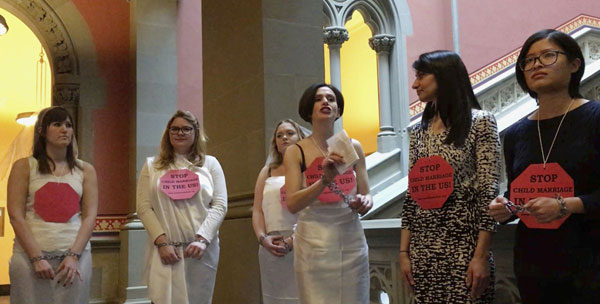By Angelica Acevedo
In New York state, a law that allowed teens as young as 14 years old to get married existed for nearly 90 years. On June 20, however, Gov. Andrew Cuomo signed legislation that raised the age of consent to 18.
The new law will also require parental and judicial consent for marriages of 17- and 18-year-olds.
The legislation, which was sponsored by Assemblywoman Amy Paulin (D-Scarsdale) and state Sen. Andrew J. Lanza (R-Staten Island), received support from Cuomo and various other organizations across the city — such as the National Organization for Women in NYC, the Women for Afghan Women and the Center for the Women of New York.
“This is a major step forward in our efforts to protect children and prevent forced marriages,” Cuomo said, “and I am proud to sign this legislation that puts an end to child marriage in New York, once and for all.”
The law prohibits anyone under 17 years old from getting married and provides guidance for judges to determine whether or not a 17-year-old should get married.
Cuomo’s office said the judge must also ensure that the applicant is entering the marriage “of his or her own free will, they are not being compelled by force, fraud, or coercion, and the marriage will not endanger the mental, emotional, or physical safety of the applicant.”
Under the previous law, the minimum age for marriage was 18, allowing children 16 and 17 to do so with parental consent as well as children 14 and 15 to do so with parental and judicial consent. It did not provide judges any guidance on determining whether or not to grant consent.
From 2000 to 2010, New York State Health Department data shows over 3,800 minors got married, with 84 percent of marriages involving minors occurring between teenage girls and adult men.
The National Organization for Women in NYC campaigned for two years advocating for the new law by rallying, lobbying and educating the public. Sonia Ossorio, the president of NOW, believes that the “harms of child marriage are clear.”
“New York now recognizes early or forced marriage as a human rights violation,” Ossorio said. “I hope that the change in law will give girls who find themselves in this position the knowledge that they can say ‘no.’ ”
In contrast, New Jersey Gov. Chris Christie, citing religious and cultural freedoms, vetoed a law in May that would impose the state’s first age restriction in marriage to 18.
New York was one of only three states to allow 14 year olds to legally wed — the other two are Alaska and North Carolina. Over a dozen other states have no statutory minimum age for marriage in place.
According to a Pew Research Center 2016 report, child marriage rates vary by state, with above-average rates in the South and West.
Naheed Samadi Bahram, the program director for Women for Afghan Women based in Fresh Meadows, said New York’s legislation will “have a positive effect” for Americans, but also for South Asian immigrants.
“It’s a great achievement, and we’re all very happy that it finally happened,” Bahram said. “The worst thing about that law was that they could marry at 14 years old, but couldn’t get divorced until 18. Now, they can divorce at 17, as well.”
Studies show that women who marry at a young age are at high-level risk of suffering mental and physical health problems, domestic violence and are less-likely to complete their education.
State Sen. Toby Stavisky (D-Flushing) said “it’s amazing that it took this long” to pass the law.
Ann Jawin, the founder of the Center for the Women of New York based in Borough Hall, said this was a “wonderful victory.”
“I am so pleased that this law passed,” Jawin said. “I believe that the fact that there are women on the council helped with this.”




































